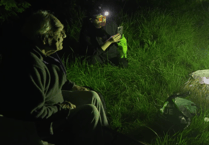A tradition dating back more than four hundred years returned at Farnham’s historic coaching inn The Bush Hotel this month, as the Chancellor of the Exchequer, Bishop of Guildford and other distinguished guests joined the great and good of Farnham at the town’s ritualistic Venison Dinner.
Though in modern times a genteel, black tie affair – the dinner has quite a rowdy back story, first held in the Old Goats Head pub in 1605 in an attempt by the Bailiffs and Burgesses of Farnham Castle to stop townsfolk from poaching deer from Farnham Park.
The old trope goes that it only served to give the peasants a taste for venison. But less known is the dinner’s links to political and religious dissonance and uprising.

Though not quite as old as the dinner itself, an event that underlines the legend of the Farnham Venison Dinner is also marking its tricentennial anniversary this year when, three hundred years ago, Farnham found itself at the centre of a poaching saga that triggered parliamentary action – the passing of the infamous Black Act of 1723.
The roots of the Black Act can be traced back to an era marked by economic downturn and social unrest following the South Sea Bubble collapse in 1720.
Two groups of poachers, famously known as the ‘Blacks’ because of their habit of blackening their faces during raids, wreaked havoc on the lands of local landowners in the Hampshire and Windsor Forest areas.
The first wave of activity began in October 1721 when 16 poachers descended upon Farnham Park, the property of the Bishop of Winchester, resulting in the theft of three deer and the death of two others. Four of the poachers were later caught, with two released for lack of evidence and the others pilloried and sentenced to a year and a day in prison.
But the capture and punishment of some of the Blacks failed to deter their vengeance, however, with further attacks on the Bishop’s property after their convictions.
The economic turmoil of the time fuelled the resentment of these poachers, who targeted the wealthy estates in acts of defiance and calculated retaliation. Their “calculated programme of action, and a conscious social resentment” was said to distinguish them from normal poachers, and in reprisal for the earlier arrests and sentences, they took 11 deer and killed many more.
The situation escalated with a royal proclamation offering a £100 reward (equivalent to £16,000 in 2021) for information leading to the arrest of the gang.
And in March 2023, an innkeeper in Horndean testified that a meeting had taken place in his inn between MP Sir Henry Goring , who fled to France after a Jacobite plot to depose George I a year earlier, and Philip Caryll, cousin of the Jacobite Lord Caryll of Harting and a member of the infamous ‘Waltham Blacks’.
With a link between the Jacobite cause and the Blacks established, parliament moved quickly to quash an uprising and the Blacks’ Jacobite allegiance was the primary reason for the passing of the Black Act.
This draconian law, officially titled “An Act for the more effectual punishing wicked and evil disposed persons going armed in disguise and doing injuries and violence to the persons and properties of His Majesty’s subjects,” came into force on May 27, 1723.
A legislative sledgehammer, the Black Act expanded the criminal code and specified over 200 capital crimes.
Anyone who was armed and with a blacked face or “otherwise disguised” and found in a forest, chase, down or Royal Park could be sentenced to death. Similarly, it was an offence to hunt, kill, wound or steal deer in those locations, with the first offence punishable by a fine and the second by penal transportation.
Other criminalised activities included fishing, the hunting of hares, the destruction of fish-ponds, the destruction of trees and the killing of cattle in those locations, the last of which also punishable by death.
An offender could also be executed for setting fire to corn, hay, straw, wood, houses or barns or shooting another person.
The same penalties applied to attempting to rescue anyone imprisoned under the Black Act or attempting to solicit other people to participate in crimes that violated it.
In total, the Act introduced the death penalty for more than 350 criminal acts, and severe consequences for villages that failed to apprehend alleged criminals.
The legislation cast a dark shadow over the accused, with suspects facing summary judgment and execution if they failed to surrender within 40 days.
The Black Act’s impact reverberated through history until its partial repeal in 1823, under the reform bill introduced by Robert Peel.
The Act’s legacy, however, continued to be felt as late as the Jacobite rising of 1745-46, when reports suggested the resurgence of the Blacks in Hampshire.
Daniel Gee





Comments
This article has no comments yet. Be the first to leave a comment.